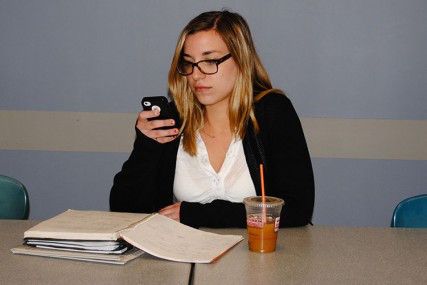
Researchers at the Miriam Hospital’s Centers for Behavioral and Preventative Medicine found that media usage, such as social networking and text messaging, negatively impacted the GPAs of college-aged women.
Whether someone is hitting the books in the library or completing an online problem set, the temptation to procrastinate is always present. Facebook is often opened in another computer tab and a cellphone is always nearby, buzzing with text messages or Twitter updates.
Regardless of the type of media being used, these distractions are always calling your name.
College students may want to think twice about the amount of time they spend using social media, according to a study performed by researchers at the Miriam Hospital’s Centers for Behavioral and Preventative Medicine.
The study, which was publicly released on EurekAlert.org April 11, focused on college-aged women, who were found to spend close to 12 hours a day using media. The research suggests that media negatively impacts grade point averages. However, researchers said two exceptions — reading the newspaper and listening to music — might positively impact academic performance.
Constructing the study
Adolescent media usage has been thoroughly examined through previous research, especially in participants between the ages of 15 and 18, said the study’s lead author Jennifer Walsh. However, little is known about the effect of media on emerging adulthood. This concept caught Walsh’s attention.
“There has not been a lot of focus on the first year of college,” Walsh said. “This is a time when young people are in a transition.”
Often, college is a person’s first true experience of independence, Walsh said, since people in this age group are no longer monitored by parental oversight. Although college students are enrolled in and attending classes, they are essentially free to choose how they spend their time.
The study focused on women in this emerging adulthood period. Walsh had been conducting a longitudinal study on women’s general health when she became interested in using the data for another purpose.
“We started thinking about where media would have an impact, especially when we saw the volume of media used by these women,” Walsh said about the data.
Although the available data was the main reason for the study’s focus on females, Walsh noted another motive. She explained it is necessary to split men and women into two groups and study them separately as gender is a determinant in how media is used.
Women, Walsh said, spend more time making phone calls, texting, listening to music, reading and social networking. Men, on the other hand, more often occupy themselves with video games, newspapers and computers.
The research
Walsh said she studied a sample of 483 first-year female college students from a college in the northeastern U.S. According to the study, these participants — who were also part of a larger study on health — completed an online assessment related to health and psychosocial adjustment each month during the course of one year.
The participants recorded their media usage and GPA twice during the year. Researchers focused on a variety of media types.
“We tried to be comprehensive and look at every type of media we could think of,” Walsh said. “There were 11 types we looked at.”
These media types included television, movies, music, the Internet, social networking, talking on a cellphone, texting, magazines, newspapers, books and video games.
Women were found to use 11.8 hours of media per day in January and 12.1 hours of media per day in July. These numbers do not take multitasking into account, according to the study.
“The 12 hours could include texting while on the Internet, so half of the day is not spent using media,” Walsh said. “All media use sums up to 12 hours.”
Walsh said researchers were particularly interested in what would explain the link between media use and academic performance.
“We looked at some mechanisms: Academic behaviors, academic confidence and academic problems with schoolwork, such as mental health, depression, anxiety and drinking,” she said. “It seemed as if they all played some role in explaining the associations with GPA.”
Walsh found that social media had a negative effect on GPA. Many of these effects were indirect and affected a student’s grades through these academic mechanisms. It was determined that music and newspaper reading, unlike other forms of media, are beneficial to student GPA.
“We don’t know for sure why music is beneficial,” Walsh said. “We thought students might be using it while they are studying — that it might make studying more enjoyable and make students want to keep studying. It may be related to academic behavior.”
College of Communication senior Quin La Capra said she tries to incorporate these positive media forms into her daily routine.
“I find music helps me concentrate,” she said. “I zone out when I really need to get stuff done, so I can see that being beneficial.”
COM junior Luana Grasso added that she finds newspaper reading helpful to her life as a student.
“I recently started reading the newspaper,” Grasso said. “… I think it helps because you are up to date and you get practice in reading and understanding things that are not the usual things you are reading.”
Walsh said researchers also found media types used varies throughout the year. New media forms, such as the Internet and cellphones, are used more often during the school year, while traditional media forms — magazines, television, and books — are used more often during the summer.
Media use may also be related to availability of media types, Walsh explained. Students may be using traditional forms of media more often in the summer because they do not have them available in their dorm. The type of media used may also be related to a student’s amount of free time.
“In the summer, students may be at a job where they cannot use the Internet or social networking,” Walsh said.
She added that social networking and cellphones may be used more often during the school year to stay in touch with family and friends.
Reactions from the BU community
A number of students said they were not surprised about the amount of media used by women in the emerging adulthood period, although they were not sure whether it is always detrimental to academic success.
College of Arts and Sciences senior Rachel Kessler said people will always find forms of distraction from their work.
“I can see how people are drawn into [media] as a distraction,” she said. “At the same time, before computers and things like that, people were still distracted by gossiping in person. They were still distracted by people, but people in a different form.”
School of Management sophomore Fiona Chen said she disagreed with the claim that social media is a distraction to schoolwork. In her experience, she said, she has never found it to be an issue.
“Because [social media] is so integrated into my daily life, it is just like checking, checking, checking,” Chen said. “But it is, I guess, one minute or two minutes each hour. It does not take away from my study habits.”
La Capra was not surprised by the volume of media used by college-aged women, although she agreed with Chen and Kessler and said she was doubtful about the relationship between media use and GPA.
“I don’t really see the two as directly connected,” La Capra said. “I think the same can be said for people that just don’t focus in general.”
The future
These results may be useful in an academic setting to decrease the negative impact of media on GPA, although Walsh said there might be limits.
“If we can find a way to reduce media use, we can improve academics,” Walsh said. “It is not realistic or practical to do this because media is such a central part of [emerging adults’] lives.”
Walsh said there is a different route to improving academics. Instead of trying to eliminate media usage, it may be beneficial to incorporate it into students’ lives in a positive manner.
“There may be ways to integrate social media into the classroom,” Walsh said. “The professor can use it in a way that will link students to resources, connect them with their classmates and remind them of their assignments.”
Walsh said another option might be to teach students time management skills. Students can take a 45-minute block of time to study without using their cell phone, which may improve concentration.
Walsh, however, stressed that this is only an initial study and that readers must be wary of the results.
“Before we begin implementing and planning, we would want to confirm these results with other samples,” she said. “The take-home message here is that a lot of media is used by women, and there is some evidence that the correlation is negative.”





























































































































PR Firms in India • Apr 24, 2013 at 8:26 am
Social Media is a tool intended for increasing productivity. It is up to you how you use it. You have to use it optimally support your business, not just pass time on it.